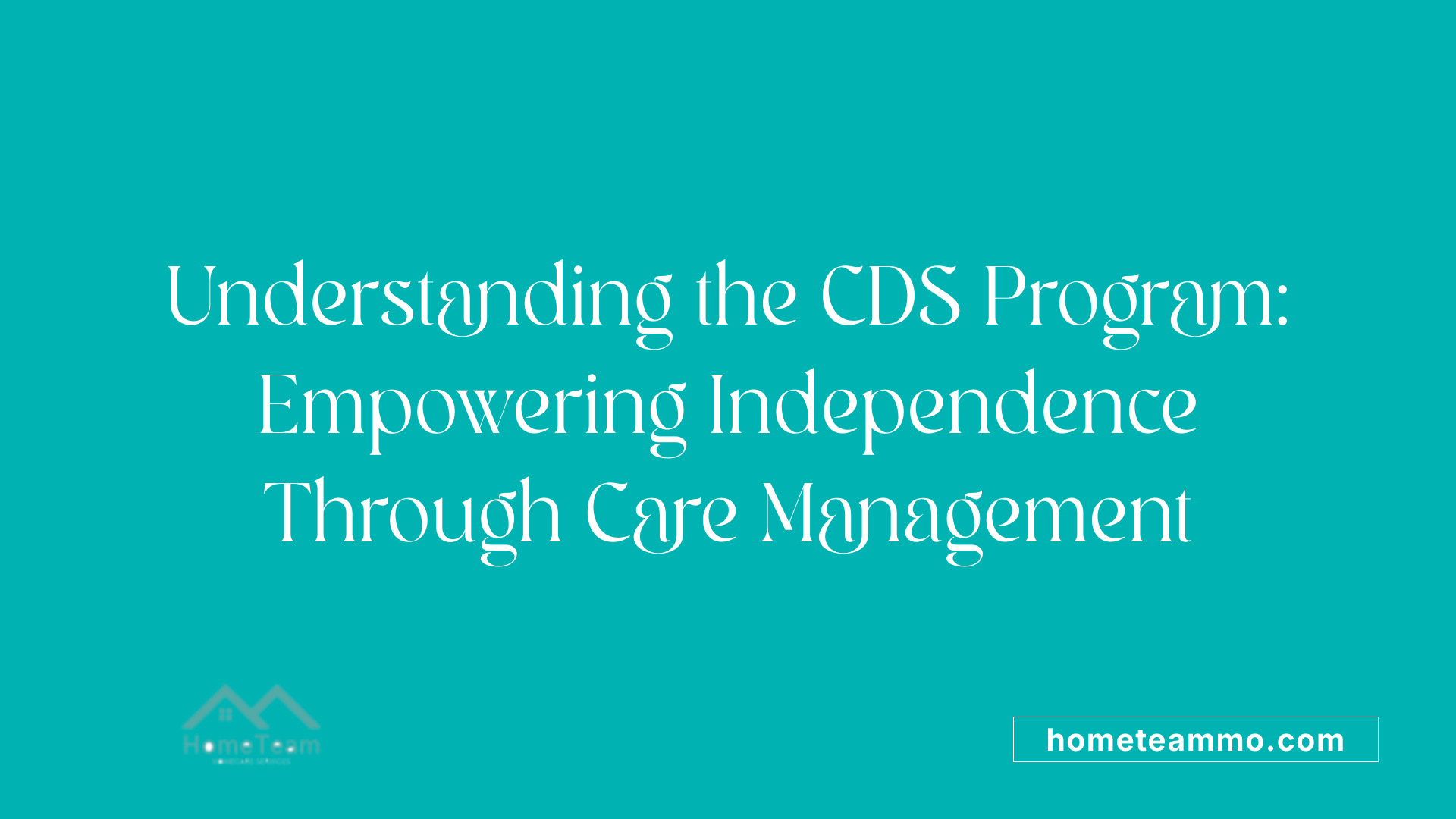Managing Administrative Tasks in Self-Directed Care
Streamlining Self-Directed Care: Balancing Independence with Administrative Efficiency

Understanding Self-Directed Care: Empowerment through Administration
Self-directed care programs provide individuals with disabilities the opportunity to live independently by giving them control over their care services. While this empowerment promotes autonomy and personal choice, managing the associated administrative tasks can be daunting without the right support mechanisms in place.
The Consumer-Directed Services (CDS) Program Explained

What is the CDS program for Medicaid?
The Consumer-Directed Services (CDS) program for Medicaid, particularly through the Consumer Directed Personal Assistance Program (CDPAP), empowers individuals to take control of their own care. This innovative program emphasizes personal choice by allowing beneficiaries to select their caregivers and manage the services they receive. Participants can hire aids who assist with daily living tasks tailored to their specific needs, fostering greater independence and ensuring that care is delivered in a way that aligns with their preferences.
Benefits to Medicaid beneficiaries
Participating in the CDS program offers various advantages. This approach promotes autonomy, enabling participants to choose caregivers from their own networks, including friends or relatives. By managing their own personal assistance services, individuals can adapt the support to fit their unique requirements, enhancing both their quality of life and overall satisfaction with care. Furthermore, this flexibility can lead to lower costs compared to traditional agency-based care models, making it a financially appealing option for many.
Eligibility requirements
Eligibility for the CDS program generally involves meeting in-state Medicaid criteria, which typically requires proof of a chronic illness or a disability that necessitates long-term care. Prospective participants must also demonstrate their ability to manage their care or designate a representative to assist in this process. This system ensures that those who can benefit most from personalized care have the opportunity to engage fully in their service delivery.
Self-Directed Services in Action

What are examples of self-directed services?
Self-directed services primarily include personal care, transportation, and respite services, each tailored to meet individual needs, as specific options may differ by state within Medicaid programs. This care model allows people with disabilities to maintain independence by empowering them to manage their own care routines. Participants can choose to hire and train their own caregivers, ensuring that services are personalized and accommodating.
The flexibility inherent in self-directed care means that individuals can make adjustments as their needs evolve. For example, someone might begin with personal care assistance and later add transportation services to help facilitate community engagement.
Role of choice and flexibility
Central to self-directed services is the principle of choice. Participants exercise direct control over their services, including decisions about who provides care and how those services are delivered. This independence fosters a sense of ownership and satisfaction, as individuals can create service plans that align with their preferences.
Flexibility is also a significant advantage. As circumstances change, recipients can modify their service agreements to better fit their developing needs—whether that means increasing hours for caregiving, bringing in a new service professional, or accessing additional resources.
Support systems available
Navigating the self-directed care landscape requires robust support systems. Financial Management Services (FMS) play a critical role by managing payroll and ensuring compliance with regulations. Case managers provide vital assistance in developing service plans and connecting individuals with necessary resources. Support brokers further help participants by advocating for their needs and guiding them through the administrative aspects of self-direction.
Together, these support systems help individuals confidently manage their services and ensure that their self-directed plans deliver the independence and quality of life they seek.
Responsibilities in Self-Directed Care: What Clients Need to Know

What are three client responsibilities in self-directed care?
Three client responsibilities in self-directed care include:
Effectively Managing Support Dollars
Clients are responsible for utilizing their individualized budget wisely. This means understanding what services they need and how to best allocate their funds to secure those services, ensuring they can maintain their independence and functionality within the community.Making Informed Decisions
Clients take an active role in choosing their services, which includes evaluating options, interviewing potential caregivers, and setting expectations. This empowerment allows them to reflect their personal choices, ensuring that the care they receive aligns with their specific needs and preferences.Fulfilling Employer-Related Duties
When hiring personal care assistants, clients must handle a variety of employer responsibilities. This includes managing payroll, processing timesheets, and ensuring tax compliance—often with the help of Financial Management Services (FMS). Clients must stay organized and informed to fulfill these roles, reinforcing the importance of preparation in their caregiving arrangements.
Management of Administrative Tasks
For those who opt to hire directly, administrative responsibilities can be overwhelming. Clients must manage caregivers' schedules, communicate tasks, and ensure performance evaluations are conducted. Utilizing resources like FMS can ease this burden by helping with payroll and compliance requirements.
Importance of Informed Decision-Making
Informed decision-making is a vital component of self-directed care. Clients need to understand their options, which can require ongoing education about available services and their rights. By being well-informed, they can advocate for themselves and make choices that truly reflect their needs, significantly impacting their overall quality of life.
Key Roles in Self-Directed Care: Clients, Caregivers, and Beyond

Different Roles Within Self-Directed Care
Self-directed care thrives on a variety of roles that collectively promote independence for individuals with disabilities. The primary participants include:
| Role | Description | Key Responsibilities |
|---|---|---|
| Client | Also known as Participant or Consumer, they control their care. | Hiring caregivers, managing budgets, and training. |
| Employer | Can be the Client or an appointed representative. | Responsible for caregiver management and oversight. |
| Caregiver | Provides personal support and care to the Client. | Daily care tasks including personal assistance. |
| Case Manager | Facilitates the Client's needs and coordinates services. | Assessing needs and creating service plans. |
| Fiscal/Employer Agent | Manages financial aspects such as payroll and budgets. | Ensures compliance and aids in budgeting. |
Fiscal/Employer Agent's Role in Managing Administrative Burden
The Fiscal/Employer Agent (F/EA) acts as a crucial ally for Clients. This role alleviates significant administrative responsibilities by handling payroll functions, taxes, and ensuring compliance with program regulations. They help Clients maintain accountability by providing monthly expense summaries and insights into their budgets, allowing for better financial oversight. Furthermore, the F/EA can help Clients navigate through complex regulations, making the self-directed experience smoother and more manageable.
Interplay Between Clients, Care Managers, and Financial Management Services
The Client, Case Manager, and Financial Management Services (FMS) function in a collaborative ecosystem. While the Client makes personal choices regarding their care, the Case Manager assesses needs and coordinates services to realize those choices. Meanwhile, the FMS agency supports Clients by streamlining financial responsibilities. Together, these roles create a cohesive system, empowering Clients to take charge of their care while ensuring that necessary supports are available for effective management.
Hiring and Managing Staff in Self-Directed Care

Process of Recruiting and Managing Caregivers
Individuals in self-directed care have the authority to recruit and manage their caregivers, which involves several steps. The first step is creating a clear job description that outlines the tasks, requirements, and expectations for the caregiver role. This helps attract suitable candidates who are more likely to meet the client’s specific needs.
Next, clients should post job ads in various locations, both online and within their community, broadening their reach. Once applicants are received, conducting interviews is essential; clients can practice through mock interviews to build confidence, especially if they experience cognitive challenges.
Strategies for Retention and Performance Reviews
After hiring, managing the caregiver's schedule and performance is crucial. Regular communication about tasks and expectations fosters a positive working relationship. Additionally, showing appreciation can help retain employees, as caregivers are more likely to stay with clients who respect and value their work.
Performance reviews should be conducted to address any issues promptly and ensure high-quality service. This practice helps clarify expectations and facilitates open dialogue between the caregiver and client.
Importance of Creating Clear Job Descriptions
Creating a clear job description is vital as it not only helps narrow down the pool of applicants but also sets specific conditions that candidates must meet. It ensures both the client and caregiver have a mutual understanding of the role, which can significantly enhance the effectiveness of care provided.
Navigating Medicaid Requirements and Infrastructure
Complexities of Medicaid in self-directed care
Navigating the complexities of Medicaid for self-directed care involves understanding various assessments and eligibility criteria. To qualify for self-directed services, individuals must demonstrate the ability to manage their own care or appoint a representative. This includes a thorough assessment of medical, functional, social, and behavioral health needs, ensuring a tailored approach to service delivery.
Navigating financial management services
Financial Management Services (FMS) play a pivotal role in supporting self-directed care. These services assist participants in managing budgetary concerns, payroll, and compliance aspects, essential for maintaining smoothly run care scenarios. Participants can hire an FMS agency to oversee and manage their funds, relieving much of the administrative burden linked with direct care management.
Budgeting and compliance strategies
Participants in self-directed care need to follow outlined budgeting strategies stipulated by Medicaid. Individualized budgets are established based on the specific needs assessed, allowing flexibility in how funds are utilized for services. Compliance with state and federal regulations is enforced by FMS entities, ensuring that all financial processes align with Medicaid's guidelines. This support is critical for maintaining program integrity and empowering individuals to effectively manage their care.
Leveraging Technology and Training in Administrative Management
What are training and technology strategies for handling administrative tasks in self-directed care?
Training and technology strategies in self-directed care focus on enhancing the efficiency and effectiveness of administrative tasks. By harnessing technology solutions, such as specialized software for payroll and budgeting, care managers and support brokers can simplify complex processes. For instance, platforms can automate timesheet processing, facilitate communications, and provide transparent budget tracking, which contributes significantly to reducing administrative burdens.
Incorporating robust training strategies is equally essential. A comprehensive training approach may involve the creation of educational resources tailored to the unique challenges of self-directed care administration. This could include workshops that emphasize software use, instructional videos on best practices, and hands-on training sessions.
Continuous quality assurance is also vital in maintaining high standards. Regular feedback loops, performance reviews, and competency assessments ensure that both staff and technology adapt in response to evolving needs. This helps in identifying areas for improvement and ensures the entire self-directed system remains effective and responsive.
By blending technology with strategic training, self-directed care can continue to empower individuals, enabling them to manage their services with increased autonomy.
Empowering Independence through Effective Administration
Effective management of administrative tasks in self-directed care is crucial to maintaining the independence and personal empowerment that are central to the model. Participants, with the support of comprehensive systems and technologies, can navigate the complexities of care management, ensuring their needs and preferences drive the services they receive.
References
- Self-Directed Care: A Complete Guide to Roles - MyCIL.org
- Self-Directed Care: Finding and Managing Staff - ERI Main
- Self-Directed Services | Medicaid
- [PDF] Got Choice? - Missouri Department of Mental Health
- [PDF] Frequently Asked Questions about Self-Direction in Managed Care
- Care Management and Self-direction: Compatible? - ASA Generations
- Self-Directed Services - Consumer Direct Care Network
- Employer Responsibilities In Self-Direction - PALCO
- Understanding Self-Directed Care: What It Is and How it Works
- [PDF] Key Components of Self-Directed Services - HCBS Self ... - Medicaid

Balancing Autonomy and Assistance in Senior Care

How to prepare children with autism for family outings

The Importance of Regular Health Assessments in Home Care

How CDS Providers Assist with Household Organization

How to prepare for IEP meetings and advocate for your child

